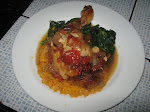I wrote about the gently meditative quality that roasting a chicken offers to one's existence, even in a nearly equatorial environment. The simple act of seasoning the bird, placing into the hot oven and then drifting away into a book and some jazz was as close to cooking serenely as I could possibly imagine. The rich and comfortingly familiar smells of roasting chicken, coupled with the gentle sounds of a jungle evening were, at that time, the very definition of comfort.
This afternoon, one in which the sun is already so far gone it feels like evening, I am preparing another bird for roasting. But this is Oregon. And more specifically, Fall on the Eastern side of the Willamette Valley; right up against the slopes of the Cascades. The temperature is in the low 40's and the birds have all hit the skies for the south. The colors of the trees, at least the ones that are still in possession of their leaves, are golden, scarlet and rust made all the more striking by being set against the dark green of the firs.
In Costa Rica, I kept the accompaniments simple, not really much in the Roast Chicken canon goes with the tropical weather, and in truth, a good deal of the chicken ended up served over a neighbor's lovely creekside grown watercress. Here, I've got the weather on my side to create the full-on roast chicken experience. I've got a stalk of locally grown brussels sprouts and smoked bacon. I've got fat golden potatoes and pungent heads of garlic from our own gardens. And best of all, I've got a supply of rich chicken stock for the gravy that should so rightfully come from the pan once the chicken has vacated it.
I still have the jazz, oozing and snaking from the speakers, but this time the music wafts up into the smell of the smoke from our wood burning stove (not to mention the early scents from the chicken arising from the oven). The fading light from the jungles has been replaced by a wonderful steam on the windows and rather than easing into a cooling jungle evening, we are cozy and warm here in our wooded house on a cold Fall night. Best of all, I am not alone for this roast chicken, and it is SO much better to have someone with whom to share such a simple but basic realization of pleasure and yes, comfort.



























































No comments:
Post a Comment